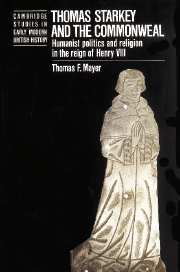Book contents
- Frontmatter
- Contents
- Acknowledgements
- A note on citations and abbreviations
- Introduction
- 1 Early life and education
- 2 Humanism from the source
- 3 ‘Occasyon and tyme wyl never be restorey agayne’: Pole, Paris and the Dialogue
- 4 A responsible aristocracy
- 5 The Dialogue in classical and ‘medieval’ tradition
- 6 An English spirituale
- 7 ‘Homo politicus et regalis’
- 8 Writing for the drawer
- Conclusion
- Bibliography
- Index
5 - The Dialogue in classical and ‘medieval’ tradition
Published online by Cambridge University Press: 03 November 2009
- Frontmatter
- Contents
- Acknowledgements
- A note on citations and abbreviations
- Introduction
- 1 Early life and education
- 2 Humanism from the source
- 3 ‘Occasyon and tyme wyl never be restorey agayne’: Pole, Paris and the Dialogue
- 4 A responsible aristocracy
- 5 The Dialogue in classical and ‘medieval’ tradition
- 6 An English spirituale
- 7 ‘Homo politicus et regalis’
- 8 Writing for the drawer
- Conclusion
- Bibliography
- Index
Summary
Instead of building up a context around Thomas Starkey largely by means of recovering personal contacts, this chapter documents how Starkey appropriated several ‘traditions of discourse’ (in Andrew Lockyer's sense) which go beyond the proximate inspiration and limitation which Starkey's immediate environment provided, his relation to an ideological context of aristocratic political thought, in other words. This is not an exercise in uncovering Starkey's ‘sources’. In addition to the severe limits on the explanatory power of source-hunting, Starkey's eclecticism renders it especially unrewarding. Nevertheless, some of the materials with which Starkey apparently worked can at least be plausibly isolated in his experience. For example, we know Starkey read Aristotle on politics at Magdalen, even though, unlike Cicero, we cannot point to a particular person who probably tutored Starkey. Again, he almost certainly studied Aristotle's ideas in more depth along with Plato's in Italy. Unfortunately, some of the most important facets of Starkey's thinking only suggest points of contact with similar bodies of thought. All the same, there can be little doubt that Starkey came in touch with English traditions of the power and position of the nobility, which coalesced with Starkey's oligarchical civic humanism to produce the main thrust of his political programme. A prima-facie case points to Reginald Pole as Starkey's political mentor, but the evidence to support this supposition comes from much later in Pole's life.
Before Starkey can be placed in any new traditions, he must be disconnected from an extraordinarily persistent but fundamentally wrong-headed old one.
- Type
- Chapter
- Information
- Thomas Starkey and the CommonwealthHumanist Politics and Religion in the Reign of Henry VIII, pp. 139 - 168Publisher: Cambridge University PressPrint publication year: 1989



